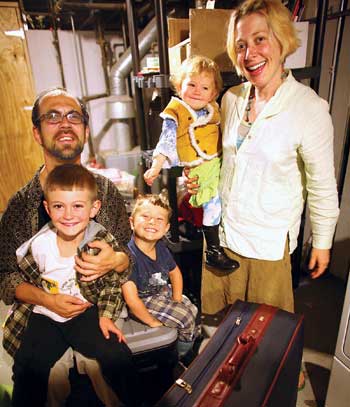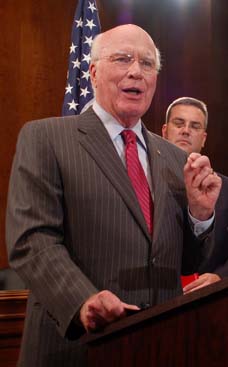
In Madriz, 3.5 out of every 10 babies are born to women under 19. Thomas said this led her to believe that teaching sex education to youth would be a valuable asset to the impoverished community. Her job would be to promote current programs and implement new methods to lower the teen birthrate. She was one of a handful of outsiders in the small community, and the only black foreigner many had ever seen. Thomas' outgoing personality seemed diametrically opposed to the closed mindset of the Madriz natives. "They just stared at me all the time with a blank look in their eyes," Thomas remembers. She was surprised at first because her experiences in other Latin countries and even in larger Nicaraguan cities had been full of warmth. "The people were not warm and welcoming. They were very interested in me but seemed scared to have a conversation." Those first months in Madriz were difficult, not only because of the lack of openness among the people but also due to the adjustment of living without electricity and running water. Thomas' host family consisted of four sisters and their 12 children. The children did not have relationships with their fathers but knew who they were when they passed on the dusty main road. While the sisters were aware that problems plaguing their area were due mostly to the absence of commitment and provision by men, they didn't seem too interested in changing anything themselves. She believes absent fathers are so ingrained in the culture that it will take several generations for anything to change. "I saw quickly that this was not a good situation and realized the importance of my job and began stressing the importance of postponing sex and motherhood," Thomas said. She also attributes some of the problems plaguing Nicaragua to the violent 1980s when many men died and families were fragmented during the war.
Kadesha Thomas served in the Peace Corps as a sex education teacher and youth worker in rural Nicaragua
Oak Parkers abroad
The village's diversity has inspired some with a desire for more
By ABIGAIL CRAMTON
Contributing Reporter
Caption: Kadesha Thomas spent her Peace Corps tenure in Nicaragua working to lower the rate of teen pregnancy in Madriz.
OK, the first person to answer the question gets to touch my hair," Kadesha Thomas remembers saying repeatedly during her time as a sex education teacher and youth worker in rural Nicaragua. Thomas, who is African-American, recently returned from serving with the Peace Corps for over two years in Madriz, a mountainous area in the north of the country, 30 miles from the Honduran border.
Thomas felt like she was pulling teeth during her presentations at Casa de Maternidad. The quiet, passive women didn't know what to make of the expressive American who taught about babies but was childless.
"Once I caught on and started offering my hair as an incentive, the group perked up," Thomas said with a smile. She taught the mothers, who ranged from 13 to 55, about nutrition, newborn health, preventing diarrhea and birth control. When Thomas wasn't writing grants, creating curriculum and teaching different groups about sexual health issues, she enjoyed learning from her neighbors and discussing issues of the day.
For Oak Parkers like Kadesha Thomas, David Wells and Jane Zawadowski the desire to make a difference has taken them to other countries. And they take a little of their hometown with them.
[Excerpt]
Nicaragua
When Kadesha Thomas moved to Oak Park from Forest Park in the mid-'90s, she was struck by the cultural differences almost immediately.
"My curiosity was sparked regarding differences in our world through my time at OPRF [High School] and as a resident of the village," said Thomas. "Oak Park reflected diversity in race as well as interests. These things made me wonder more about our world."
After graduating in 1999, Thomas received a degree in journalism from Florida A&M University and had dreams of working in magazine publishing. However, working in the high-pressure, semi-vapid world of glossies soon lost its appeal and Thomas searched for opportunities that she felt mattered. Her interest in health care led her to Johns Hopkins University where she received a Master in Public Health degree and first began thinking about the Peace Corps.
After being accepted in 2007, Thomas, a Spanish minor in college, requested a placement in Latin America. As one of 20 new health care volunteers in Nicaragua, she chose the position of sex ed teacher and youth worker.
In Madriz, 3.5 out of every 10 babies are born to women under 19. Thomas said this led her to believe that teaching sex education to youth would be a valuable asset to the impoverished community. Her job would be to promote current programs and implement new methods to lower the teen birthrate.
She was one of a handful of outsiders in the small community, and the only black foreigner many had ever seen. Thomas' outgoing personality seemed diametrically opposed to the closed mindset of the Madriz natives.
"They just stared at me all the time with a blank look in their eyes," Thomas remembers. She was surprised at first because her experiences in other Latin countries and even in larger Nicaraguan cities had been full of warmth. "The people were not warm and welcoming. They were very interested in me but seemed scared to have a conversation."
Those first months in Madriz were difficult, not only because of the lack of openness among the people but also due to the adjustment of living without electricity and running water.
Thomas' host family consisted of four sisters and their 12 children. The children did not have relationships with their fathers but knew who they were when they passed on the dusty main road. While the sisters were aware that problems plaguing their area were due mostly to the absence of commitment and provision by men, they didn't seem too interested in changing anything themselves. She believes absent fathers are so ingrained in the culture that it will take several generations for anything to change.
"I saw quickly that this was not a good situation and realized the importance of my job and began stressing the importance of postponing sex and motherhood," Thomas said. She also attributes some of the problems plaguing Nicaragua to the violent 1980s when many men died and families were fragmented during the war.
Living with a local family was educational. When she first tried to make rice, many of the village women laughed at her mush. Nicaraguan women take great pride in making rice and, thanks to her host family, she quickly learned their secrets. The women were astonished at Thomas' love of reading and could not understand her enjoyment of books. After night fell, Thomas retreated to her room with a high-powered flashlight and her book of the week.
Her only interaction with other Americans came from a middle-aged missionary couple from Oklahoma who live in Madriz. "I learned a lot from them," Thomas said. "It was great to be able to share the struggles and victories with them."
Despite hardships, Thomas came to love the work she was doing. As a sex ed teacher at a teen clinic sponsored by the government and a nongovernmental organization (NGO), Thomas focused on medical care for teens and educational outreach. She started nine youth groups in neighboring communidades and trained youth leaders to teach their own groups.
Thomas was free to create her own curriculum and able to make changes as she got to know local teens. As director of area youth groups, she trained them on delivery and information for topics, including HIV prevention, teen pregnancy, domestic violence prevention, women's rights, drug and alcohol abuse, self esteem, and assertive communication.
Surprisingly, Thomas discovered that the Nicaraguan NGO had the money to run programs, but didn't have time to write grants or the experience to handle the administration or teaching required for their projects. Soon, she was writing grants for everything from gas to rice and notebooks, and her youth groups began growing.
Juan Carlos was 17 when he joined Thomas' youth group. He was quieter than most, but his teacher quickly noticed his attentiveness and punctuality. As a youth promoter, he shared the information he learned with the rest of his group on days when she wasn't able to make the journey to his poor neighborhood. When Thomas announced that Madriz would be competing in the country's Knowledge Bowl, she thought long and hard about the topic and teens she would select for the four-person team.
When she asked Juan Carlos to be the team leader, he was ecstatic. However, when Thomas announced their topic was the menstrual cycle Juan Carlos became reluctant. After some prodding by his teacher, he committed to the team which eventually won the competition.
"I am so proud of all of them," Thomas said, "but especially Juan Carlos. After the competition, he started volunteering at the health center and worked in the birthing room." Juan Carlos received a scholarship and started medical school in February. He plans on becoming an obstetrician and returning to work at the health center in Madriz.
During her second year, Thomas began working intensely at the local maternity clinic. The mortality rate for infants and mothers is high in the area for several reasons. Many of the women hike for several hours from their small, mountainous villages and, like most of the population, are malnourished. Few fruits and vegetables grow in the region, causing the people to subsist on rice and beans.
Several women tried to introduce her to their sons or brothers in the hopes that a love match might occur, not to mention a green card. Thomas graciously declined all offers.
"Living in Madriz made me much more thankful for my country, even with its faults. The opportunities I have as a woman are endless and in Nicaragua that is simply not the case," said Thomas.
Many of the issues she encountered, such as teen pregnancy, domestic violence and parental abandonment, require major shifts in public opinion before lasting change can be made. Thomas is hopeful, not just because of the work she did, but because of the work natives like Juan Carlos are going to do.













